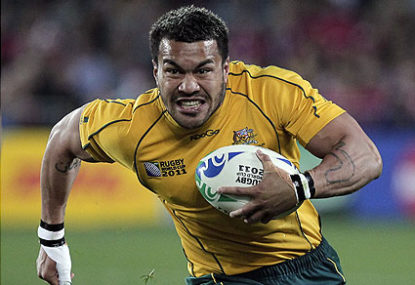Of the 25 names read out last Sunday in the first Wallabies squad for the Test series against the British and Irish Lions, eight players – 32 percent of the squad – are of Polynesian descent.
Sekope Kepu, Saia Fainga’a, Sitaleki Timani, Wycliff Palu, Israel Folau, Christian Leali’ifano, Joe Tomane, and Digby Ioane.
Throw in Matt Toomua, Ben Tapuai, Radike Samo, the other Fainga’a twin, and the rest of the Polynesian players currently on Super Rugby contracts in this country and Australia is becoming the new New Zealand.
The ‘brown brothers’ are taking over!
In all seriousness though, the statistics above do ask the question: is rugby in Australia doing enough to fully represent and recognise the fastest growing population within the game?
If you look at a team sheet for Sydney or Brisbane club rugby on any given weekend, Polynesian names are prevalent.
Yet there is no formal recognition of this administratively, either at the states or the national union.
There should be.
While I’ve no doubt the development officers at community level are doing a great job, the Pacific community is a distinct beast.
More often than not, these kids come from larger families and grow up in the middle to lower socio-economic sector of the population.
This creates challenges in terms of paying club fees, buying boots, being able to ferry the kids to their rugby games and so on.
It’s a big commitment, especially in households where both parents are working.
Sitaleki Timani was brought up in his village in Tonga by his mother after his father died while he was young.
He comes from a big family, two of whom (Sita and his brother, Tongan international Sione Timani) have gone on to play international rugby, while their younger brother Lopeti has featured at Super Rugby level.
The Timanis are a great example of overcoming the odds.
But many more don’t.
How many future Kepus or Tatafu Polota-Naus are falling through the cracks and being missed out on due to these challenges?
Who are the best people to assist these families, and to identify who needs help, and who needs encouragement?
Inevitably Tatafu Polota Nau’s name gets mentioned whenever the Pacific Island rugby presence in western Sydney is raised publicly.
As an unofficial ambassador, both for the Parramatta Two Blues club and Polynesian rugby in general, ‘Taf’ has done a great job raising awareness, all of which has been of his own initiative.
But should this be left to him to do? Why aren’t we seeing more from the official bodies?
New ARU CEO Bill Pulver is waxing lyrically about a Super Rugby ‘B’ competition to grow the base of players capable of taking a step to the next level.
Based on the numbers playing the game, maybe an Australian Polynesians tournament should be the go instead!
At the moment, a lot of Polynesian kids get syphoned off to rugby league.
League is playing it smart. They get into the schools, identify the talent and then provide the financial support required to ‘capture’ the kids.
AFL is the same. It targets indigenous talent but the way it goes about it is something rugby should also be looking at.
I’ve heard of stories where kids who were spotted playing rugby have been ‘lured’ across to league by financial and other ‘assistance’ that has even included taking on board younger brothers on contracts as well!
That is a big step, but it does highlight an area where the 13-man code appears to be doing more, among a playing populace that is a critical ingredient to the health and well-being of Australian rugby.
Through the Lloyd McDermott Foundation, which does excellent development work, indigenous rugby is rightly receiving the support and encouragement it needs, which will hopefully build up the Aboriginal presence at the professional level in time.
Yet that influence will always be a fringe element in the process of developing Wallabies: there are more players of Polynesian decent in the national team now than there have been indigenous players in the last 20 years!
So why is the game sitting on its hands?
The Polynesian rugby community needs a boost as well; if only a more coordinated approach to its management, perhaps with a Pacific Islands division, to look after its welfare.
On the evidence of the list of Wallaby names announced last weekend, surely it would be a great investment!






























































































